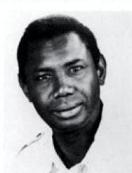Massa Makan Diabaté facts for kids
Massa Makan Diabaté (June 12, 1938 – January 27, 1988) was a Malian historian, author, and playwright.
Biography
Born in 1938 in Kita, Massa Makan Diabaté was the descendant of a long line of West African poets (griots). His uncle, Kélé Monson Diabaté, was considered a master griot, and Massa Makan Diabaté once said that he owed much to his uncle's teaching: "I am what Kèlè Monson wanted me to be when he initiated me into the Malinké oral tradition. And I’ll say that I betrayed him by writing novels. I’m the child of Kélé Monson, but a traitorous child." Diabaté began training as a griot at the age of seven, though his training would later be interrupted to allow him to study in Guinea. He eventually moved to Paris, where he studied history, sociology, and political science before working for a number of international organisations such as UNICEF or UNESCO.
Returning to Mali, Diabaté settled into an administrative post in Bamako. His early works Janjon et autres chants populaires du Mali (Janjon and other popular songs of Mali, 1970), Kala Jata (1970), and L'aigle et l'épervier ou la geste du Soundjata (The Eagle and the Sparrowhawk or the Gesture of Soundjata, 1975), were French-language versions of Malinké epics and folktales. In 1971, Janjon was awarded the Grand prix littéraire d'Afrique noire, bringing Diabaté his first international recognition. His trilogy of novels Le lieutenant, Le coiffeur, and Le boucher de Kouta (The Lieutenant, The Barber, and The Butcher of Kouta, 1979–1982) won the 1987 Grand prix international de la Fondation Léopold Sédar Senghor.
Massa Makan Diabaté died in Bamako on January 27, 1988. The Malian government has named two high schools after him, one in Bamako and the other in his home region of Kayes.
Redefining and reclaiming the griot
Although a griot himself, Diabaté came to see his contemporaries as parasites and beggars who often ... history and abused their roles in pursuit of wealth: “After Mali’s independence, griots became, in my opinion, what I would a call a parasite.” The state of griots was a key theme in his work.
However, Diabaté also believed that the image of the griot was reparable, and he saw literature as a catalyst to achieving that end. While he perhaps derived his initial legitimacy due to his belonging to the Malinké oral tradition, he sought to return the role of the griot to its former glory by betraying that tradition in favour of the written word.
Fasiya and Fadenya
Diabaté took on the role of griot as this was assigned to him by his lineage. In his younger years, as is often the case, Fasiya was dominant. But given Diabaté’s evaluation of contemporaneous griots, it is no surprise that he sought distinction by abandoning the oral tradition, and temporarily his homeland. Fadenya is, however, ultimately positive, as competition is a creative force. When he returned to Mali, drawn back by his commitment to the community and country that raised him, his Fasiya, that which he created was incorporated into the tradition. By introducing the written word to the keepers of the oral tradition, Diabaté effectively changed the canons.
This dialectic of Fasiya and Fadenya is a defining characteristic of the Malian hero, the paradigm of which being the Epic of Sundiata Keita, and Diabaté features it prominently in his own novels. For example, in Le boucher de Kouta, the protagonist, a butcher, sells donkey meat to his clients without telling them despite the fact that it is against Muslim norms to eat donkey meat. The butcher is, in this sense, abandoning his traditional role and responsibilities. However, the residents of Kouta benefit greatly from the availability of affordable meat. Diabaté demonstrates that sometimes norms must be broken, and tradition must be betrayed, in order to effect positive change.
See also
 In Spanish: Massa Makan Diabaté para niños
In Spanish: Massa Makan Diabaté para niños


